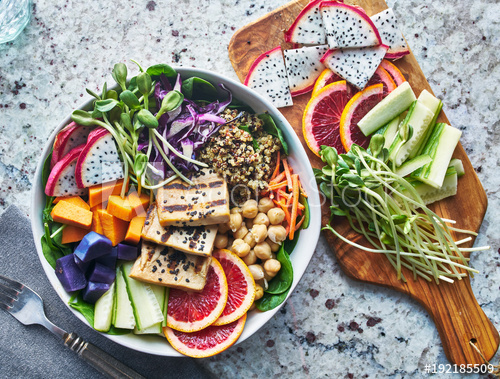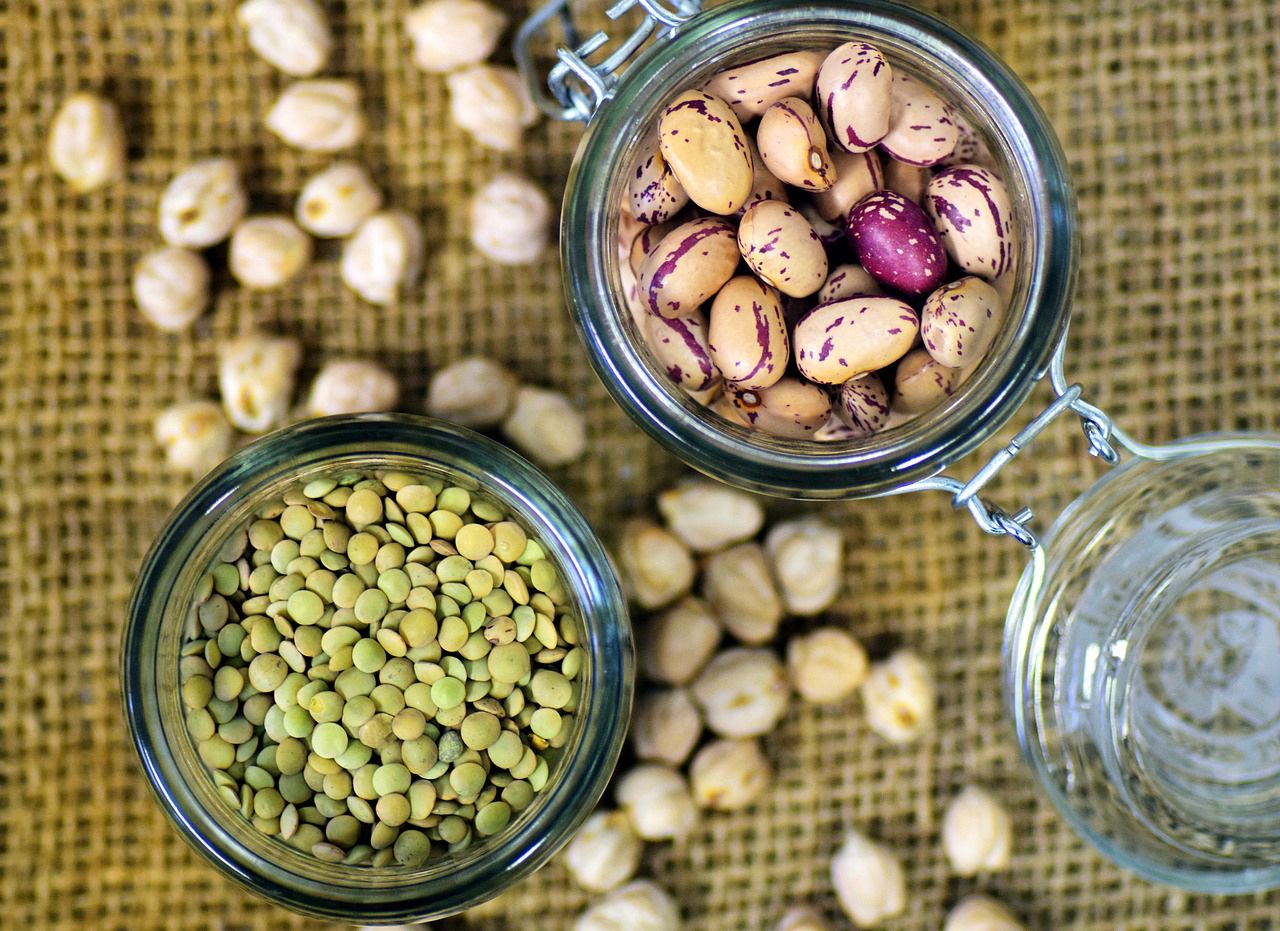How To Make Sure You’re Getting The Necessary Nutrients, Vitamins And Minerals On A Plant-Based Diet.
There are many well-documented benefits of following a plant-based diet. As well as the obvious benefits to our furry friends and helping reduce the strain on the environment, there can be significant benefits to your health. I am so incredibly happy that the movement is gaining such momentum, and that more and more people are making the transition to a plant-based diet. I receive lots of questions about my diet and have pulled together a guide to help answer some of the more common ones: Do vegans need to supplement? Can you still get all the necessary vitamins on a plant-based diet? What do I need to consider? The key to thriving on a plant-based diet is to include a large variety of foods – well-planned vegan diets contain all necessary vitamins and minerals needed for a healthy diet.
Personally, since adopting a vegan lifestyle, I have noticed a significant increase in my energy levels, as well as improved strength and much clearer skin. Not only this, but I gain so much satisfaction knowing that I am having a positive impact on animal suffering whilst reducing my footprint on the environment. NutritionFacts.com explains how a plant based diet can also significantly improve depression, anxiety and productivity. Eating a well-balanced vegan diet that includes plenty of whole grains, vegetables and fruits is one of the healthiest and most sustainable ways we can thrive. This is reiterated in an article released by our national health information service, Healthdirect, that states ‘a vegetarian diet…can help reduce the risk of heart disease, type 2 diabetes, obesity and some types of cancer.’
Despite the obvious benefits of enjoying a plant-based diet, regular blood tests are recommended. These tests are a way of sense-checking our diets and determining whether our bodies are struggling to absorb specific vitamins and nutrients. They also show your lipid profile which measures the amount of cholesterol and fats in your blood. Maintaining a health lipid profile is crucial to minimising your chances of heart attacks or strokes. Try to track your blood test levels over time; by doing so you can ensure your nutritional needs are being met. It is important to note that blood test results and absorption rates of vitamins and minerals will vary with age, gender, season, diet and activity level. If your blood test results show any deficiencies or excess nutrients, it is a good idea to seek nutritional guidance. If you’re searching for a nutritionist who specialises in whole food, plant-based nutrition, please check out the amazing Sami Bloom.
The main Vitamins, Minerals and Nutrients that you need to consider when adopting a plant-based diet are:
· Vitamin D
· Iron
· Calcium
· Vitamin B12
· Selenium
· Omega Fatty Acids
· Zinc
· Iodine
Vitamin D:
As Australians we don’t normally have too many problems getting sufficient Vitamin D, but for those who may only get several weeks of sunshine a year, this may not be enough to supply your recommended intake. Vitamin D helps increase your calcium absorption and is important for your immune system and bone strength. The recommended dosage of Vitamin D is equivalent to receiving direct sunlight to your face and hands for 15 minutes, 3 times a week. If you are unable to get outdoors in the daytime, you can consume Vitamin D through mushrooms, fortified foods or Vitamin D supplements.
Iron:
Iron is an essential mineral that helps make haemoglobin, facilitating the transport of oxygen around the body. If you’re low on iron then it is likely you will experience low energy, a compromised immune system and perhaps shortness of breath or dizziness. If you do experience these symptoms, please seek medical advice. As mentioned, in order to check your iron levels, it is a good idea to complete periodic blood tests. I recently discovered that my iron was extremely low – so low in fact that I had to have an iron infusion to stabilise my levels. Along with this, I have tried to incorporate more food sources rich in iron into my diet. Many plant-based foods are rich in iron, such as tofu, legumes, dark leafy greens, molasses, oats, dried apricots, raisins, lentils and pumpkin seeds. However, it is more difficult for the body to absorb non-meat sources of iron, so it is helpful to pair with foods rich in Vitamin C, aiding absorption.
For further explanation of ways you can manage your iron levels on a plant-based diet, check out Plant Proof’s article here.
Calcium:
Calcium is important for healthy teeth, to maintain strong bones and ensure strong communication from the brain to the body. Although there is less calcium found in plant-based foods than dairy products, the calcium that is found in these foods is absorbed more efficiently. In fact, an article on the US National Library of Medicine states that there have been studies that show Osteoporosis and the risk of fracture in the elderly can be reduced by diets that are higher in plant-based foods rather than animal products. Good sources of calcium include dark leafy greens such as kale and spinach, milk and yogurt alternatives like soy and rice milk, sesame seeds, almonds, figs, broccoli, carrots, fortified tofu, fortified orange juice and breakfast cereals.
Vitamin B12:
Vitamin B12 is linked with supporting a healthy nervous system and helps maintain your energy levels and immune system. There are not many plant based foods that contain B12 and therefore it is easy to end up becoming deficient. This is an essential vitamin that will be checked in all baseline blood tests. Nutritional yeast is the plant-based food with the highest amount of B12 and is easily incorporated into meals like salads and pasta, adding a cheese-like flavour. B12 can also be found in tofu, spirulina and fortified cereals, however it is more efficient to take an oral supplement or receive periodic B12 injections as the higher dosage remains in your system for a prolonged period of time.
For a more in-depth explanation on what every vegan should know about Vitamin B12, check out the Vegan Health article here.
Selenium:
Selenium is essential for our immune systems and can help to support fertility. You can find it in many plant-based sources such as brazil nuts, mushrooms, sunflower seeds and baked beans. Because brazil nuts include a lot of Selenium, having 1 or 2 each day fulfils the recommended intake.
Omega fatty acids:
These play a crucial role in regulating your blood pressure and supporting cardiovascular health. Good sources of Omega 3 & Omega 6 fatty acids include flaxseeds, chia seeds, hemp seeds and walnuts. This is something I find very easy to incorporate in my diet – chia seeds form a staple in my smoothies, and flaxseeds are an excellent replacement for eggs (they act as a binding agent) when making pancakes or any baked goods.
Zinc:
Zinc is important for cell metabolism and immunity. We only need a small amount of this nutrient and it can be found in foods such as tofu, kidney beans, chickpeas, cashews, sunflower seeds and dark chocolate (like we need another excuse…).
Iodine:
Iodine is an important mineral when it comes to the maintenance of a healthy thyroid and metabolism. This mineral is perhaps the most underrated one, and does not receive nearly as much attention as it should. It is recommended to get a daily intake of 150 mcg – the best sources are in potatoes, nori, beans and cranberries.
Protein:
I have included this macronutrient purely because I am often asked ‘But where do you get your protein from?’ The image of the skinny, protein-deficient vegan is a stereotype that has long been perpetuated, but in actual fact it is very easy to meet the recommended protein intake as long as calorie intake is sufficient. Plant-based foods rich in protein include tofu, oatmeal, lentils, chickpeas, peanut butter, soy milk, almond, spinach, broccoli, rice… the list goes on. Additionally, I love to add my Tropeaka salted caramel protein to my post workout smoothies. Please note that this range functions in just the same way as regular whey protein and is not required for a nutritionally balanced diet.
In short, eating a well-planned, plant-based diet with a large variety of whole foods will easily provide your body with all the necessary vitamins, minerals and nutrients. For those who are curiously about transitioning to a plant-based diet, or if you are looking to expand your knowledge, there are an abundance of resources available, whether it be through online documentaries such as Forks Over Knives, reading vegan magazines and books like Becoming Vegan, or simply through visiting some of the vegan cafes and spaces which are breaking onto the scene.
For more vegan resources check out the below list :)
· https://samibloom.com/category/nutrition/
· https://www.nrv.gov.au/nutrients
· https://daa.asn.au/voice-of-daa/hot-topics/#
· https://www.veganaustralia.org.au
· http://thevword.net/vegan-education
· https://www.wholefoodsplantbasedhealth.com.au/vitamin-minerals/#res
DISCLAIMERS
The information, views, recommendations and opinions presented in this blog:
(a) are intended as a source of general information only
(b) are NOT intended to diagnose, prevent, treat or cure specific medical issues
(c) may need to be adapted to suit each individual depending on their specific health issues (e.g. pregnant, nursing or on medications) and
(d) should not be used as a substitute for nutritional, medical or other advice by a qualified health professional
Our Soul Purpose, Dara Hayes and any other associated entities, disclaims all liability, real or perceived, for any adverse effects that may be sustained in relation to the use or application of information, advice or recommendations offered or the consumption or application of any products suggested or recommended.
Image credit: Vegan Liftz


